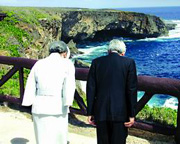 |
| Japan's Emperor Akihito has paid tribute to the victims of fierce fighting on the Pacific island of Saipan during World War II. |
Japan's Emperor Akihito has paid tribute to the victims of fierce fighting on the Pacific island of Saipan during World War II.
The emperor bowed at memorials to the Japanese, US and Korean dead, in his first visit to a foreign battlefield.
About 43,000 Japanese troops and 12,000 civilians died after being ordered to fight to the death in the 1944 battle. Some 5,000 American soldiers also died.
The visit came amid unease among Japan's neighbours at its wartime past.
The emperor and Empress Michiko laid wreaths and stood in silence at memorials on the island, which was an important Japanese defensiveoutpostduring WWII but is now part of the US-administered Northern Mariana Islands.
The emperor and empress also visited the cliff top from where hundreds of Japanese civilians committed suicide at the end of the battle, rather than face US capture.
The BBC's Jonathan Head, in Saipan, says the emperor and empress cut two lonely figures as they contemplated the appalling loss of life there.
The Saipan visit is one of only a few official ceremonies Japan is planning to mark the end of World War II in the Pacific, ahead of the 60th anniversary of Japan's surrender on 15 August.
The anniversary is likely to be marked by disquiet among Japan's neighbours, especially China and South Korea, who say Japan's official apologies for its wartime record are not sincere.
Even in Saipan - where feelings towards Japan are generally warm - there were diplomatic difficulties.
Despite the emperor's stated intention to commemorate all of the island's victims, a memorial to Korean dead was unaccountably left off his schedule, prompting protests from Saipan's Korean community.
Japan colonised Korea between 1910 and 1945, and about 1,000 Koreans were sent to the island in the 1930s, although most of the current residents moved to the island after the war.
In the end, the royal couple did stop briefly and bow to the Korean monument, but no photographs were allowed.
For surviving Japanese veterans, the emperor's visit has meant a great deal, our correspondent says.
Their suffering gets little recognition in a country which would rather forget itscatastrophicdefeat.
But whatever his private wishes, the rigid protocols surrounding Emperor Akihito's first visit to a foreign battlefield gave him no opportunity to make a more persuasive display of remorse, our correspondent says.
(BBC)
|
